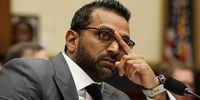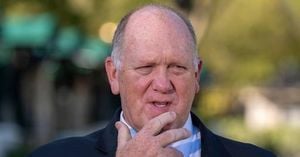FBI Director Kash Patel has found himself at the center of a political firestorm following his handling of two highly controversial investigations and a series of contentious congressional hearings that have captivated both lawmakers and the public. Patel, who was appointed to lead the FBI by the Trump administration, is facing mounting criticism from both sides of the aisle, with Democrats and some Republicans questioning his leadership and transparency in the wake of the assassination of conservative commentator Charlie Kirk and the ongoing fallout from the Jeffrey Epstein files.
The controversy erupted on September 10, 2025, when Charlie Kirk was shot at a university event in Orem, Utah. In the hours after the shocking incident, Patel took to social media to announce that the FBI had "the subject" in custody. This post quickly spread across news outlets, leading many to believe that a suspect had been apprehended. However, as reported by NBC News, the reality was far more complicated: Tyler Robinson, the man suspected of shooting Kirk, had not yet turned himself in at the time of Patel’s announcement. Instead, the suspect surrendered to authorities after a 33-hour manhunt, casting doubt on the accuracy and timing of Patel’s statement.
Utah’s governor, in a press conference shortly after Patel’s social media post, clarified that the person in custody was merely a person of interest and that the gunman remained at large. Less than two hours after his initial post, Patel updated the public, stating that the "subject" had been released after interrogation. That same evening, Patel was seen dining at Rao’s, an exclusive New York City restaurant, further fueling speculation about his priorities in the midst of a national manhunt.
Patel later defended his actions in an interview with "Fox and Friends," insisting, "I was being transparent with working with the public on our findings as I had them. Could I have worded it a little better in the heat of the moment, sure. But do I regret putting it out? Absolutely not. I was telling the world what the FBI was doing as we were doing, and I’m continuing to do that. And I challenge anyone out there to find a director that has been more transparent."
The fallout from Patel’s handling of the Kirk investigation came to a head during a series of combative hearings in both chambers of Congress the following week. According to NBC News and other outlets, Democrats seized on the opportunity to grill Patel not only about the Kirk case but also about his management of the FBI and the release of files related to convicted sex offender Jeffrey Epstein. Senator Dick Durbin of Illinois accused Patel of causing "mass confusion" with his premature post, admonishing, "Mr. Patel was so anxious to take credit for finding Mr. Kirk’s assassin that he violated one of the basics of effective law enforcement: At critical stages of investigation, shut up and let the professionals do their job." Senator Peter Welch of Vermont called Patel’s actions a "mistake," while Senator Cory Booker of New Jersey accused the director of making the country "weaker and less safe," citing what he described as Patel’s failures in the Kirk investigation and a broader pattern of problematic management at the agency.
The hearings were marked by heated exchanges, with Senator Adam Schiff labeling Patel an "internet troll" and pressing him for answers on the Epstein files and recent firings at the FBI. Patel fired back, calling Schiff a "buffoon" and a "fraud." The spectacle underscored the deep partisan divisions that have come to define oversight of the FBI in recent years.
While most Republican lawmakers stood by Patel during the hearings, voicing support for his leadership, criticism from within conservative circles has also emerged. Conservative activist Christopher Ruffo took to social media to urge Republicans to "assess whether Kash Patel is the right man to run the FBI" following the Kirk assassination. Ruffo wrote, "I'm grateful that Utah authorities have captured the suspect in the Charlie Kirk assassination, and think it is time for Republicans to assess whether Kash Patel is the right man to run the FBI. We would be wise to take a moment and ask whether Kash Patel has what it takes to get this done. I've been on the phone the last few days with many conservative leaders, all of whom wholeheartedly support the Trump Administration and none of whom are confident that the current structure of the FBI is up to this task."
Other prominent conservative voices have echoed these doubts. Candace Owens, a political commentator and former collaborator with Kirk, called the investigation into his killing a "federal conspiracy" on her Instagram story, questioning the timeline and details provided by authorities. Former Trump adviser Steve Bannon was also dismissive of the FBI’s efforts, stating, "It appears the kid had said something to the family, the family confronted him, and the family turned him in. I’m not seeing the great law enforcement work. They all came together, I got that. But this was not great law enforcement work." Bannon questioned Patel’s decision to travel to Utah, remarking, "I don’t know why Kash flew out there, you know, thousands of miles, to give us, ‘Hey, working partnerships and our great partnership in Utah.’"
Amid this political drama, another episode involving Patel captured the public’s attention. On September 22, 2025, a photo of a handwritten note by Patel, taken during his roughly five-hour testimony before the House Judiciary Committee, went viral online. The note, scrawled in blue ink on official FBI stationery, read: "Good fight with Swalwell. Hold the line. Brush off their attacks. Rise above the next line of partisan attacks." The image, captured by Getty Images photographer Win McNamee and posted by journalist Aaron Rupar, garnered over 5.3 million views and sparked a wave of commentary on social media. Some users poked fun at Patel, with one quipping, "Lmfao he’s writing words of affirmation to himself," and another comparing it to "the pep talk I give myself before every holiday with my family." Others described Patel as "an odd, unqualified man" and likened him to "a kid in school who’s just trying to pass his next calculus exam."
During those two days of bruising hearings, Patel was also questioned about his loyalty to former President Donald Trump and his handling of the Epstein investigation. When pressed by Representative Eric Swalwell about the Trump administration’s lack of transparency over the Epstein files, Patel dodged the questions by reciting his ABCs, later claiming there was "no credible information" that Epstein trafficked young women to anyone but himself. He further surprised lawmakers by stating he was unaware of Dylann Roof, the mass shooter who killed nine Black churchgoers in Charleston, South Carolina, in 2015.
The controversies swirling around Patel’s tenure have put the FBI director under a harsh spotlight, raising questions about the agency’s credibility, independence, and effectiveness at a time when trust in federal institutions is already under strain. As criticism mounts from Democrats, some Republicans, and a vocal segment of the conservative media ecosystem, Patel’s future—and the FBI’s reputation—hangs in the balance.
For now, the director remains defiant, insisting on his transparency and commitment to the agency’s mission, even as his every move is dissected and debated on Capitol Hill and across the internet. The coming weeks are sure to test both his leadership and the FBI’s ability to navigate an increasingly polarized political landscape.




